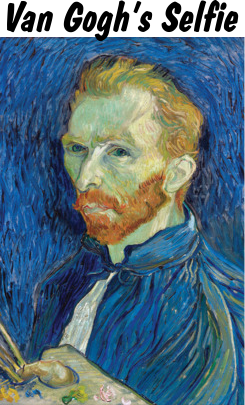










Popular Articles
Crazy-Makers: Dealing with Passive-Aggressive People
Why Are People Mean? Don't Take It Personally!
Struggling to Forgive: An Inability to Grieve
The Secret of Happiness: Let It Find You (But Make the Effort)
20 Steps to Better Self-Esteem
7 Rules and 8 Methods for Responding to Passive-aggressive People
What to Do When Your Jealousy Threatens to Destroy Your Marriage
Guide to How to Set Achieveable Goals
Catastrophe? Or Inconvenience?
Popular Audios
Audio Version of Article: Crazy-Makers: Passive-Aggressive People
Audio Version of Article: Why Are People Mean? Don't Take It Personally!
Selfies: A Sign of Low Self-esteem? Think Again
by Monica A. Frank, PhD

However, we did not find that to be true with rock and roll—now it is part of our culture and the idea that something could be wrong with it seems at best naive, and at worst, paranoid. And the same is true of selfies. Researchers found that taking and posting selfies is not a sign of low self-esteem or narcissism. It's possible that the opposite is true—those of a certain age who don't post selfies may have low self-esteem (Barry et al., 2015).
Instead, selfies may represent a time of cultural change. As much as older adults may not want to change, we need to recognize that we were part of cultural changes in our youth. Today's youth are only continuing the process. As Heraclitus, a Greek philosopher, said more than 2500 years ago: “the only constant is change.” The youth are forever changing the culture.
Barry, C. T., Doucette, H., Loflin, D. C., Rivera-Hudson, N., & Herrington, L. L. (2015). “Let Me Take a Selfie”: Associations Between Self-Photography, Narcissism, and
Self-Esteem. Psychology of Popular Media Culture. Advance online publication. DOI: 10.1037/ppm0000089
Copyright © 2016 by Excel At Life, LLC.
Permission to post this article is granted if it includes this entire copyright and an active link.
Permission to post this article is granted if it includes this entire copyright and an active link.

More PsychNotes
Parenting

Secure Attachment to Parents Improves College Adjustment
A Good Night's Sleep Doesn't Overcome the Stress of Controlling Parents
Mom: Let Go of the Guilt
How We Might Stop Bullying: Kindness Curriculum for Preschoolers
Helicopter Parenting: When Is Parental Involvement Too Much?
The Danger of Seeking Happiness: How to Protect Your Children
Aggressive Children Can Learn Control
Choose Your Own Dream: Don't Pursue What You “Should”
Praising Children Can Reduce Performance
The "Kleptoparasite" Bird Steals Food Through Intermittent Reinforcement
How Playing Violent Video Games Affects Your Children
Is It More Important for Your Children to Love You or Trust You?
Rewarding Desired Behavior vs. Everyone Gets a Reward
Teaching Children How to Handle Adversity
Another Natural Consequence Example
Natural Consequences for Children
"Just Enough" Parenting Style
"Common Sense" Approach to Praise Can Worsen Self-esteem in Vulnerable Children
Violent Video Games Cause Aggression












